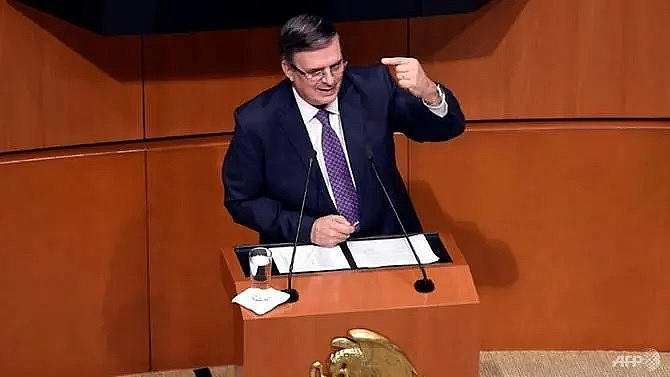Mexico ratifies new trade deal with US, Canada
 |
| Mexican Foreign Minister Marcelo Ebrard, pictured on Jun 14, 2019, assured Congress he had not agreed to Trump's demand for a "safe third country agreement". (AFP/ALFREDO ESTRELLA) |
The United States-Mexico-Canada Agreement (USMCA) passed in the Mexican Senate with 114 votes in favor and just four against, sending what the economy ministry called "a clear message in favor of an open economy and deepening economic integration in the region."
"This means foreign investment in Mexico, jobs in Mexico, access to the US market for our products," said President Andres Manuel Lopez Obrador.
There was little doubt the new deal would pass easily in Mexico: the one it aims to replace, the North American Free Trade Agreement (NAFTA), has helped turn the country into an exporting powerhouse over the past 25 years.
The next move now belongs to Canada and, especially, the US.
Canadian Prime Minister Justin Trudeau is due to visit President Donald Trump and US Congressional leaders Thursday to push for ratification of USMCA, among other issues.
The deal faces a battle in the US Congress, where opposition Democrats have criticized its worker protections, dispute resolution system and other issues.
Still, US Trade Representative Robert Lighthizer said Tuesday he was confident there would be progress on ratification in "the next couple of weeks."
He called Mexico's ratification "a crucial step forward."
In Canada, ratification looks assured - though the government is waiting to move forward until the United States does.
The three countries signed the agreement on Nov 30 after a year of thorny negotiations triggered by US President Donald Trump's insistence on replacing NAFTA, which he calls "the worst trade deal ever made."
The new deal largely resembles the original, but establishes new rules for the crucial auto sector, intended to boost US-made content in cars and increase wages for Mexican workers.
BITTERNESS OVER TRUMP'S 'BLACKMAIL'
Tension between the US and Mexico has been rife since Trump threatened last month to impose tariffs on all Mexican exports over the surge of Central American migrants arriving at the two countries' border.
Mexico managed to negotiate a reprieve from the tariffs - which were due to take effect Jun 10 - by tightening controls at its southern border and expanding its policy of taking back migrants as their asylum requests are processed in the US.
But some Mexican lawmakers accused the executive branch of caving to Trump's bullying, and put ratification of the USMCA on hold until Foreign Minister Marcelo Ebrard agreed to testify on the exact extent of the migration deal.
Ebrard assured Congress he had not agreed to Trump's demand for a "safe third country agreement," in which migrants arriving in Mexican territory would have to seek asylum there rather than the US.
Trump has vowed to make Mexico agree to such a deal if he deems progress on the migration issue insufficient after 45 days.
After Ebrard's testimony, the Senate allowed the USMCA to move ahead.
But there were barbs in the Senate over Trump's apparent willingness to blow up the countries' free-trade relationship.
"We can't go on like this ... Let's not bend over, let's not let ourselves be humiliated by threats and blackmail," said opposition Senator Antonio Garcia of the left-wing PRD party.
Still, he said he was voting for USMCA: "It's not the best deal, but it's the one we've got."
Mexico sends nearly 80 per cent of its exports to the United States, and regional free trade is broadly popular here.
Analysts saw Mexico's early ratification of the trade deal as a strategic move.
"Mexico wants to show good will and ratifying the USMCA quickly could help somewhat so that the debate focuses on ratification in the US," said consulting firm Eurasia Group.
What the stars mean:
★ Poor ★ ★ Promising ★★★ Good ★★★★ Very good ★★★★★ Exceptional
 Tag:
Tag:
Related Contents
Latest News
More News
- Russian President congratulates Vietnamese Party leader during phone talks (January 25, 2026 | 09:58)
- Worldwide congratulations underscore confidence in Vietnam’s 14th Party Congress (January 23, 2026 | 09:02)
- Political parties, organisations, int’l friends send congratulations to 14th National Party Congress (January 22, 2026 | 09:33)
- 14th National Party Congress: Japanese media highlight Vietnam’s growth targets (January 21, 2026 | 09:46)
- 14th National Party Congress: Driving force for Vietnam to continue renewal, innovation, breakthroughs (January 21, 2026 | 09:42)
- Vietnam remains spiritual support for progressive forces: Colombian party leader (January 21, 2026 | 08:00)
- Int'l media provides large coverage of 14th National Party Congress's first working day (January 20, 2026 | 09:09)
- Vietnamese firms win top honours at ASEAN Digital Awards (January 16, 2026 | 16:45)
- ASEAN Digital Ministers' Meeting opens in Hanoi (January 15, 2026 | 15:33)
- ASEAN economies move up the global chip value chain (December 09, 2025 | 13:32)





















 Mobile Version
Mobile Version